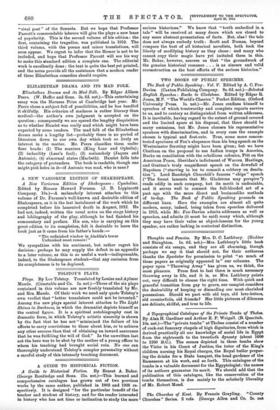TWO BOOKS OF PUBLIC SPEECHES.
The Book of Public Speaking : Vol. V. Edited by A. C. Fox- Davies. (Caxton Publishing Company. 8s. 6d. net.)--Seleeted English Speeches : Burke to Gladstone. Edited by Edgar B.. Jones, M.P. " The World's Classics." Pocket Edition. (Oxford University Press. 19. net.)—Mr. Jones confines himself to speeches of which trustworthy and complete reports survive to us, and to oratory as distinguished from written addresses. It is inevitable, having regard to the extent of ground covered and the limited space at his disposal, that there should be many omissions, but Mr. Jones chooses his representative speakers with discrimination, and in every case the example chosen is typical and first-rate. True, some more concen- tented specimen of Fox's eloquence than his long speech on the Westminster Scrutiny might have been given; but we have Chatham on the proposal to use Indian troops in America, Burke on conciliation with the rebellious colonies, Pitt on the American Peace, Sheridan's indictment of Warren Hastings, and Grattan's truly magnificent speech on the downfall of Napoleon ("starving in ice to commit a robbery on desola- tion "). Lord Randolph Churchill's famous " chips" speech (" The forest laments that Mr. Gladstone may perspire") reads oddly in such company, but its merit is undeniable. and it serves well to connect the full-blooded art of a past age with the more direct and businesslike methods of to-day. The Book of Public Speaking proceeds on different lines. Here the examples are almost all quite modern, many, indeed, being taken from speeches delivered in 1913, while Mr.. Fox-Davies admits addresses as well as speeches, and admits (it must be said) many which, although they may have their value as object-lessons for the young speaker, are rather lacking in oratorical distinction.


























































 Previous page
Previous page